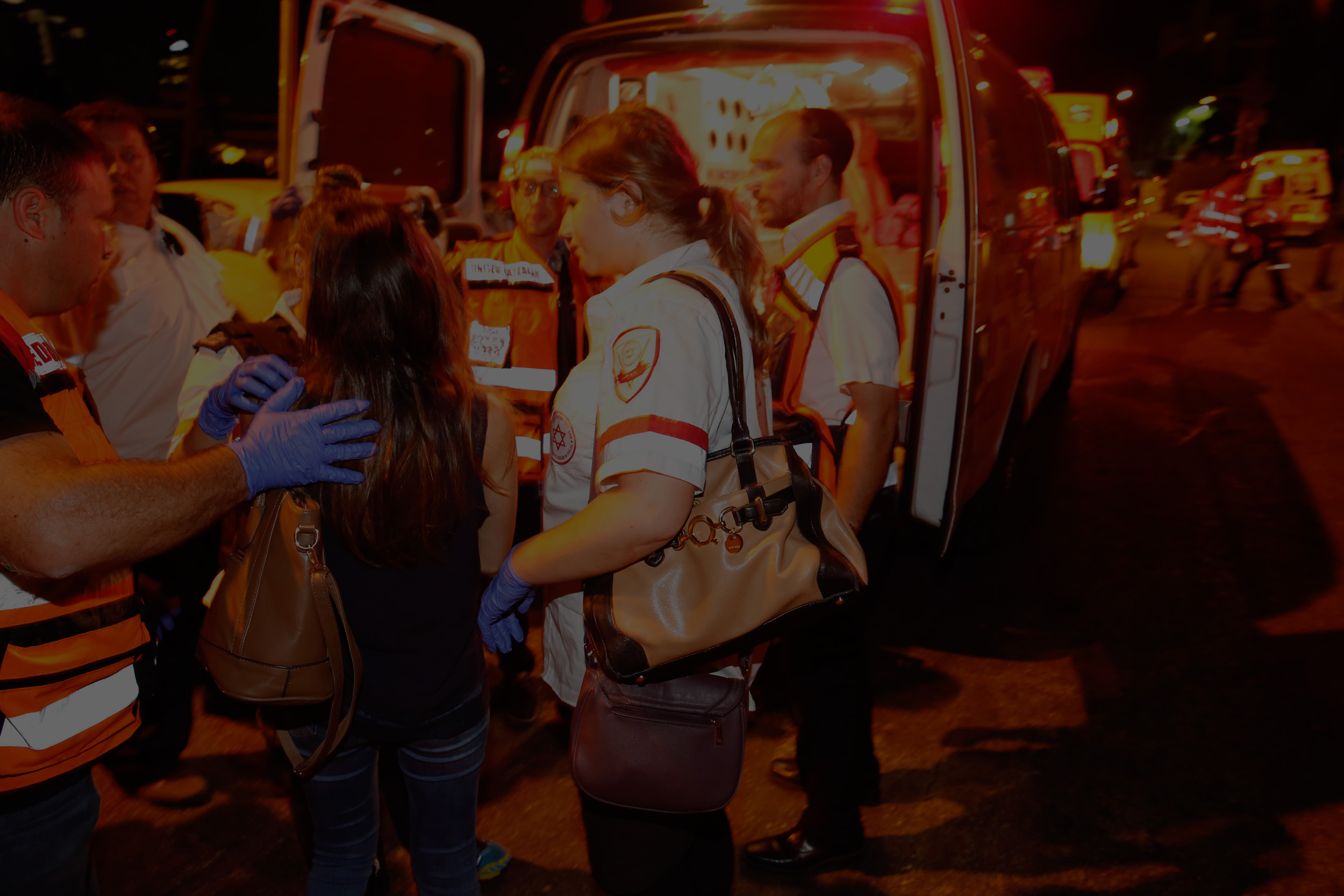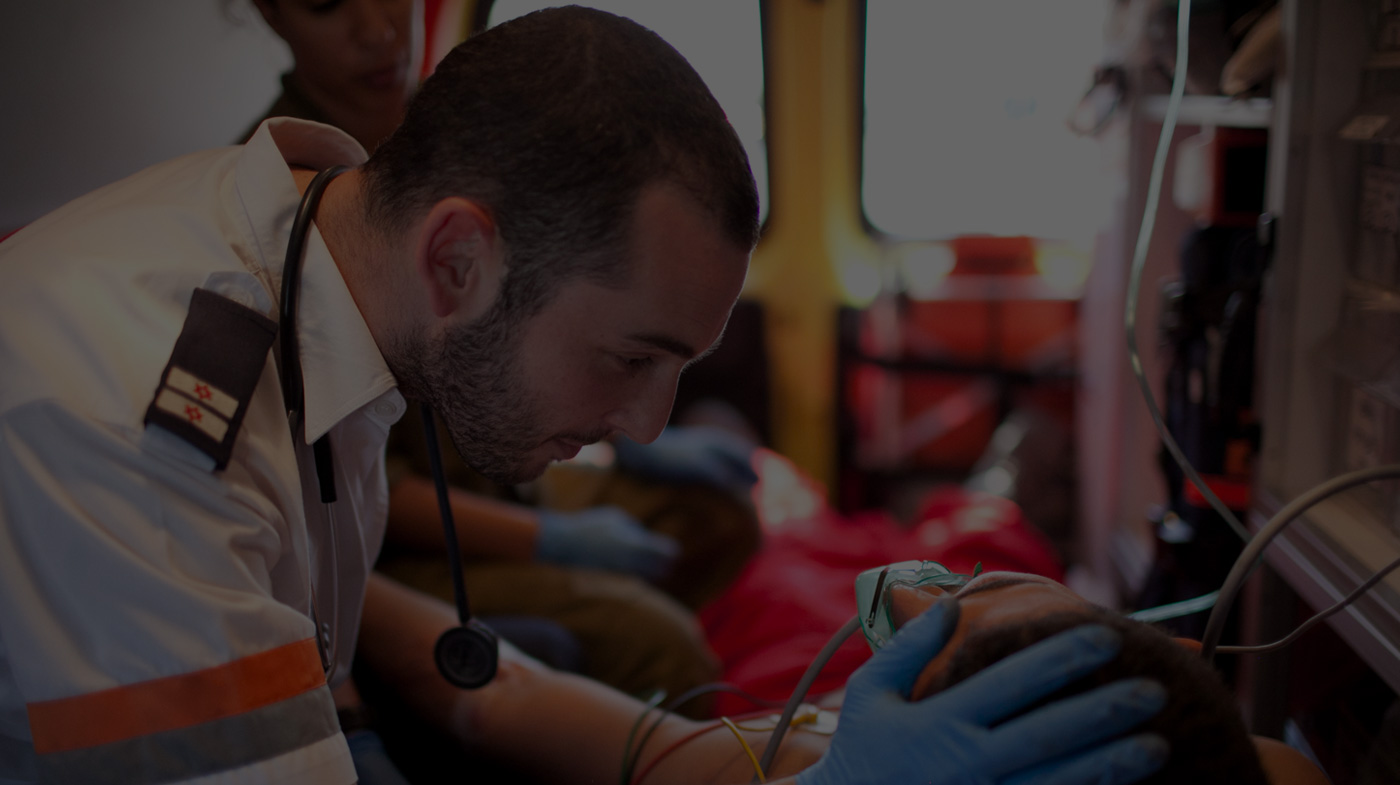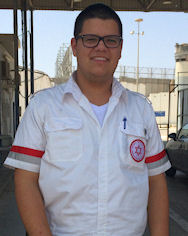 It’s 12:00pm, 26th August. I was on shift in MDA Ashdod after having done a night shift that night. We heard a call over the speaker system in the station and it was us – Intensive Care Ambulance No.23.
It’s 12:00pm, 26th August. I was on shift in MDA Ashdod after having done a night shift that night. We heard a call over the speaker system in the station and it was us – Intensive Care Ambulance No.23.
I knew the driver and paramedic from previous shifts and asked them if there was place for me in the morning. The driver, Hadar responded saying “for you, there is always place”. I was the least experienced person on the ambulance with an advanced medic as the driver, a paramedic, and another who was a teacher and had been in MDA for 2 years. I was just this 18 year old Australian, who’d done a 60 hour course, three weeks before, and had only done a few shifts.
We got into the ambulance and left the station. I asked the other volunteer to look at the tablet and tell me what the call was. He looked at me and told me that we were picking up a 17 day old baby from the border between Gaza and Israel. Shocked at this call, all that could go through my mind was that I was the least experienced person here, and most likely I’d be just watching what they were doing, and seeing how they deal with the situation – a great learning experience.
We continued on our journey to the Ashkelon station to pick up a special bed which contained an incubator with a heating system, an oxygen supply and seals where just our hands would be inside, helping the baby. We swapped out the beds and made our way to the border. Once we arrived at the Erez border crossing, we met two people from the Red Crescent who were to take the incubator and our baby ambo pump with them across the border to revive the baby.
After about 25 minutes of waiting, the Red Crescent personnel returned. I straight away realised that one of the men was standing on the side of the incubator giving breath to the baby, which had been inter-bated (a tube put through the nostril to give oxygen direct to the lungs) and connected to the oxygen supply. Our paramedic approached them and took over giving the baby breaths, whilst the other volunteer and I pushed the incubator towards the ambulance.
Once at the ambulance, two of us had to slide the incubator bed in whilst the paramedic was walking on, still giving the baby breaths. I stood back waiting for the other volunteer to get on when the paramedic said “Michael, I want you to get in the ambulance and take over from me”.
From then on, everything inside of me was telling me to freak out and that I’m not experienced enough for this. I had to remain calm and listen to everything the paramedic had to say. He told me to give the baby a breath using one or two fingers, very softly, every three seconds. If I did it to hard, I would burst the lungs and the baby would die. If I did it too softly, the baby would build up too much carbon dioxide and could die.
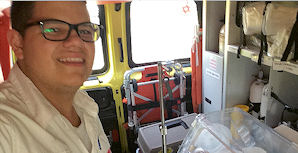 I started giving breaths and counting in my head. My heart was beating so fast that it was hard to keep a steady three seconds and then breath. The child’s grandmother got into the front seat of the ambulance next to the driver. After gaining a steady pace, the paramedic told me he’d take over again, whilst I checked the sugar level of the baby and attached a small monitor to the baby’s foot. The baby was so small that I was told by the paramedic to test the sugar level from the baby’s other foot. The sugar level was a bit high and I took over the breathing again. The paramedic attached four electrodes from a monitor, so that we could see a pulse and cardiogram.
I started giving breaths and counting in my head. My heart was beating so fast that it was hard to keep a steady three seconds and then breath. The child’s grandmother got into the front seat of the ambulance next to the driver. After gaining a steady pace, the paramedic told me he’d take over again, whilst I checked the sugar level of the baby and attached a small monitor to the baby’s foot. The baby was so small that I was told by the paramedic to test the sugar level from the baby’s other foot. The sugar level was a bit high and I took over the breathing again. The paramedic attached four electrodes from a monitor, so that we could see a pulse and cardiogram.
Now we started the journey to Barzilai Hospital. I don’t know exactly how long the drive took, but it felt like hours. Most likely it was between 30 and 45 minutes. The whole time, my job was to watch the baby’s chest rise every time I gave it a breath, and to make sure I gave it a breath every three seconds. This felt like the longest 30-45 mins of my life!
Every second I was watching this baby, thousands of things were flowing through my mind. My family, how innocent the baby was, how scary the situation was and the Arab-Israeli conflict – these were just a few things that were running through my mind.
When we arrived at the hospital, we went through the usual process. Firstly, there was the security check-point. The guard opened the door, saw the grandmother wearing a full hijab, and asked where the patient is from. The paramedic told him the patient and grandmother are from Gaza and the guard started screaming at the other security. The whole time, I had to try and stay calm as my priority was the baby, I had to give breaths every three seconds, without hesitating.
The security screamed at the paramedic saying that they need to search the whole ambulance and everyone in it – a process which would take hours. Time we did not have. We needed to get the baby inside the hospital as soon as possible. We told the security that if he didn’t let us through, the baby could die. He demanded that the grandmother gets out and has a full search. Then we’d be let in straight away as there was a medical team waiting for us.
We arrived at the hospital and the paramedic took over the breathing as we were going to be moving and have to still give breaths at the same time. The other volunteer and I took the incubator out of the ambulance. We entered the hospital to see a team of nurses waiting. We were pointed in one direction and were told once we got there, it was the wrong place. We continued through the hospital and were pointed towards the right place. We were then told that the doctor was not there yet and the paramedic told me to take over the breathing again.
The hospital nurses did the same tests as we’d done on the ambulance – pulse, blood pressure, sugar level and attached all to there monitors. The doctor finally arrived after another 20-25 minutes of giving breaths. He told us that we were going to move to another location. He took over the breathing and I pushed the incubator to where he was telling us to go.
Whilst walking through the hospital, people were looking what was happening, as there was a bit of noise and a lot of medical staff following behind. Whilst walking through the children’s intensive care area, many mothers came out too see what was happening with this baby. I turned to the side to look at one of the mothers. She had her hair covered and I could tell that she was an observant Jew. I don’t know if anyone knew that the baby was an Arab, but what I saw then, I will never forget. I saw the woman crumble to her knees as she saw what was going on and burst into tears. It was not her child, she did not know the child, but she saw that the child was suffering and she became weak at her knees.
Once the baby had been transferred to the hospital bed and the equipment swapped over to the hospital’s, our job was completed and it was now the job of the hospital and medical teams.
Looking at a 17 day old child who was unconscious and I was giving breaths, all that I wanted to tell myself and others was that no one can say that all Arabs are terrorists or all Arabs born in Gaza are terrorists. Because still today, that Arab baby who was born in Gaza is the most innocent thing that I have ever seen in my entire life. I don’t know who his father was, who his mother was or anything about the family or the story. But what I can say is that that baby, 17 days old, is 100% innocent.
I am a religious Jew, who wears a kippa, saving the life of an Arab baby from Gaza. This is who we are, this is what Judaism should be. I’ve never felt so proud to be Jewish in my entire life. As Magen David Adom, we help everyone. Whether you are Jewish, Arab, Christian, Buddhist, or any religion, race and sex, we will treat you as our own!
This experience changed my life. It changed who I am and changed who I will be. It happened 3 months ago and I still can’t tell the story in a public forum without my eyes tearing and throat closing up. I’m so fortunate to have had the opportunity to be in this amazing country we call home and to have had the opportunity to have worked alongside paramedics, drivers and other volunteers to try and make a difference – even if it is the smallest difference. This so the difference between the Red Crescent and Magen David Adom – we care about everyone, not just our own.
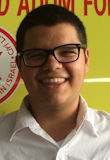 Michael Ellert
Michael Ellert
 It’s 12:00pm, 26th August. I was on shift in MDA Ashdod after having done a night shift that night. We heard a call over the speaker system in the station and it was us – Intensive Care Ambulance No.23.
It’s 12:00pm, 26th August. I was on shift in MDA Ashdod after having done a night shift that night. We heard a call over the speaker system in the station and it was us – Intensive Care Ambulance No.23. I started giving breaths and counting in my head. My heart was beating so fast that it was hard to keep a steady three seconds and then breath. The child’s grandmother got into the front seat of the ambulance next to the driver. After gaining a steady pace, the paramedic told me he’d take over again, whilst I checked the sugar level of the baby and attached a small monitor to the baby’s foot. The baby was so small that I was told by the paramedic to test the sugar level from the baby’s other foot. The sugar level was a bit high and I took over the breathing again. The paramedic attached four electrodes from a monitor, so that we could see a pulse and cardiogram.
I started giving breaths and counting in my head. My heart was beating so fast that it was hard to keep a steady three seconds and then breath. The child’s grandmother got into the front seat of the ambulance next to the driver. After gaining a steady pace, the paramedic told me he’d take over again, whilst I checked the sugar level of the baby and attached a small monitor to the baby’s foot. The baby was so small that I was told by the paramedic to test the sugar level from the baby’s other foot. The sugar level was a bit high and I took over the breathing again. The paramedic attached four electrodes from a monitor, so that we could see a pulse and cardiogram.
